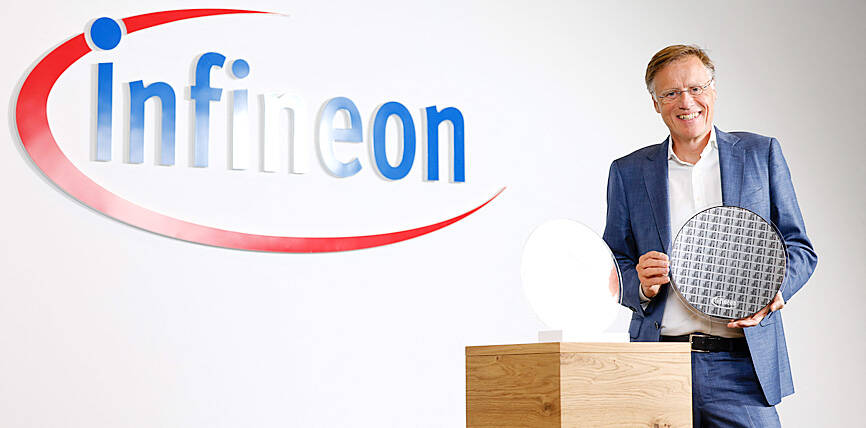German semiconductor maker Infineon Technologies AG yesterday said its part-acquisition of US firm Marvell Technology Inc would better position it to supply firms working on technologies of the future, including humanoid robots.
Infineon plans to buy the automotive division of the US rival for US$2.5 billion (2.3 billion euros) to profit from its ethernet technology, the company said in a statement late on Monday.
“It strengthens our digital control connectivity part of the company,” Infineon CEO Jochen Hanebeck said on a call for analysts yesterday.

Photo: Michaela Stache, AFP
“The combination is what makes the difference,” he added, giving the example of humanoid robots that need a variety of components, including ethernet cables.
Several hundred Marvell employees will join Infineon, which employs 58,000 people worldwide, the German company said, noting that the acquisition would “strengthen Infineon’s already strong footprint in the US.”
Marvell’s ethernet allows for the transfer of the large volumes of data needed to power software systems in cars and potentially other devices such as robots, Infineon said.
The business was expected to generate revenue of US$225 million to US$250 million for this year and would have a gross margin of 60 percent, Infineon said.
It added that Marvell’s automotive ethernet business had about US$4 billion of orders in the pipeline.
German manufacturers struggle with high energy and labor costs at home and, to sell into the US, now face the added costs of swingeing tariffs imposed last week by US President Donald Trump on dozens of trade partners.

NEW IDENTITY: Known for its software, India has expanded into hardware, with its semiconductor industry growing from US$38bn in 2023 to US$45bn to US$50bn India on Saturday inaugurated its first semiconductor assembly and test facility, a milestone in the government’s push to reduce dependence on foreign chipmakers and stake a claim in a sector dominated by China. Indian Prime Minister Narendra Modi opened US firm Micron Technology Inc’s semiconductor assembly, test and packaging unit in his home state of Gujarat, hailing the “dawn of a new era” for India’s technology ambitions. “When young Indians look back in the future, they will see this decade as the turning point in our tech future,” Modi told the event, which was broadcast on his YouTube channel. The plant would convert

‘SEISMIC SHIFT’: The researcher forecast there would be about 1.1 billion mobile shipments this year, down from 1.26 billion the prior year and erasing years of gains The global smartphone market is expected to contract 12.9 percent this year due to the unprecedented memorychip shortage, marking “a crisis like no other,” researcher International Data Corp (IDC) said. The new forecast, a dramatic revision down from earlier estimates, gives the latest accounting of the ongoing memory crunch that is affecting every corner of the electronics industry. The demand for advanced memory to power artificial intelligence (AI) tasks has drained global supply until well into next year and jeopardizes the business model of many smartphone makers. IDC forecast about 1.1 billion mobile shipments this year, down from 1.26 billion the prior

People stand in a Pokemon store in Tokyo on Thursday. One of the world highest-grossing franchises is celebrated its 30th anniversary yesterday.

Zimbabwe’s ban on raw lithium exports is forcing Chinese miners to rethink their strategy, speeding up plans to process the metal locally instead of shipping it to China’s vast rechargeable battery industry. The country is Africa’s largest lithium producer and has one of the world’s largest reserves, according to the US Geological Survey (USGS). Zimbabwe already banned the export of lithium ore in 2022 and last year announced it would halt exports of lithium concentrates from January next year. However, on Wednesday it imposed the ban with immediate effect, leaving unclear what the lithium mining sector would do in the